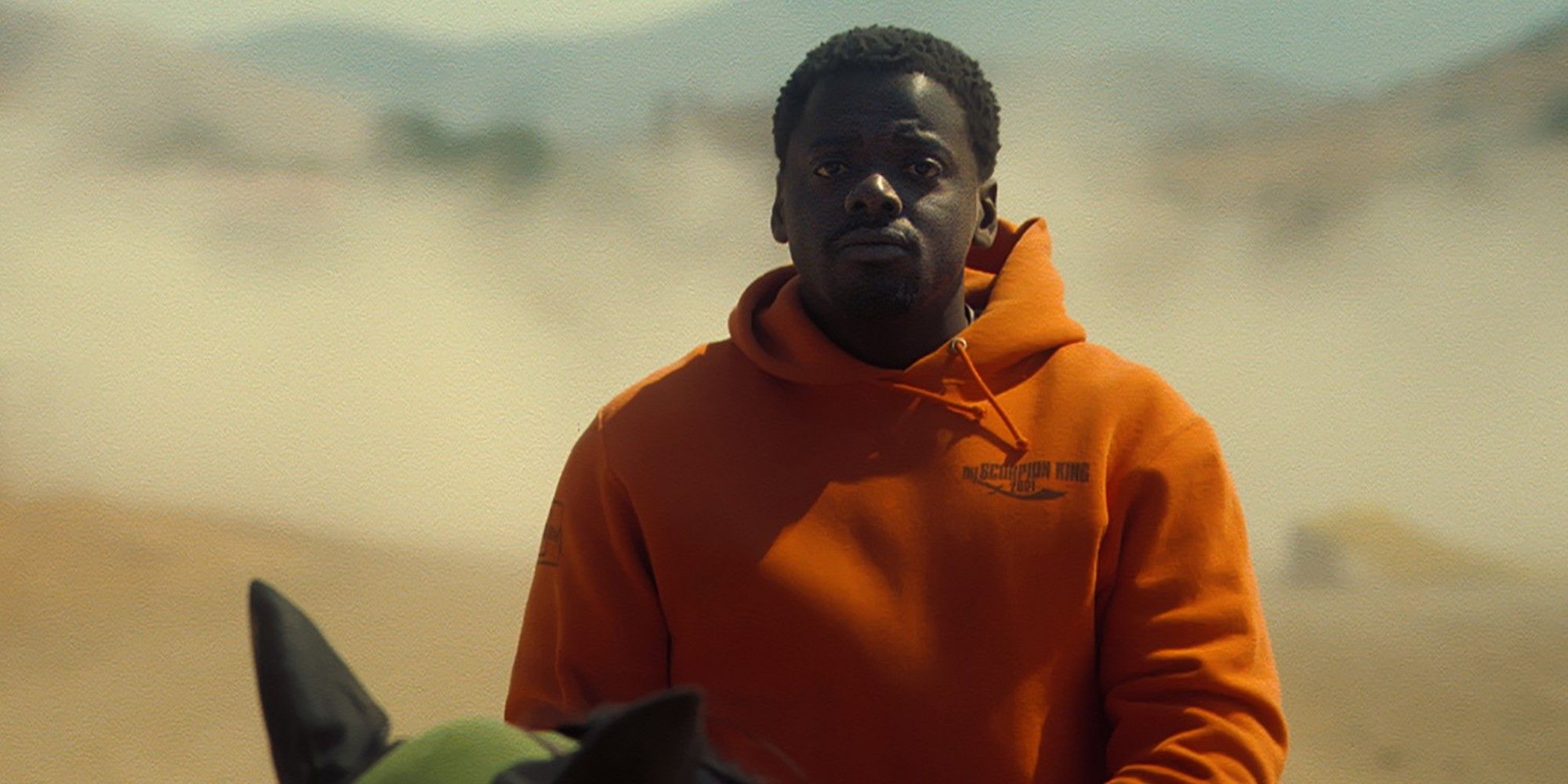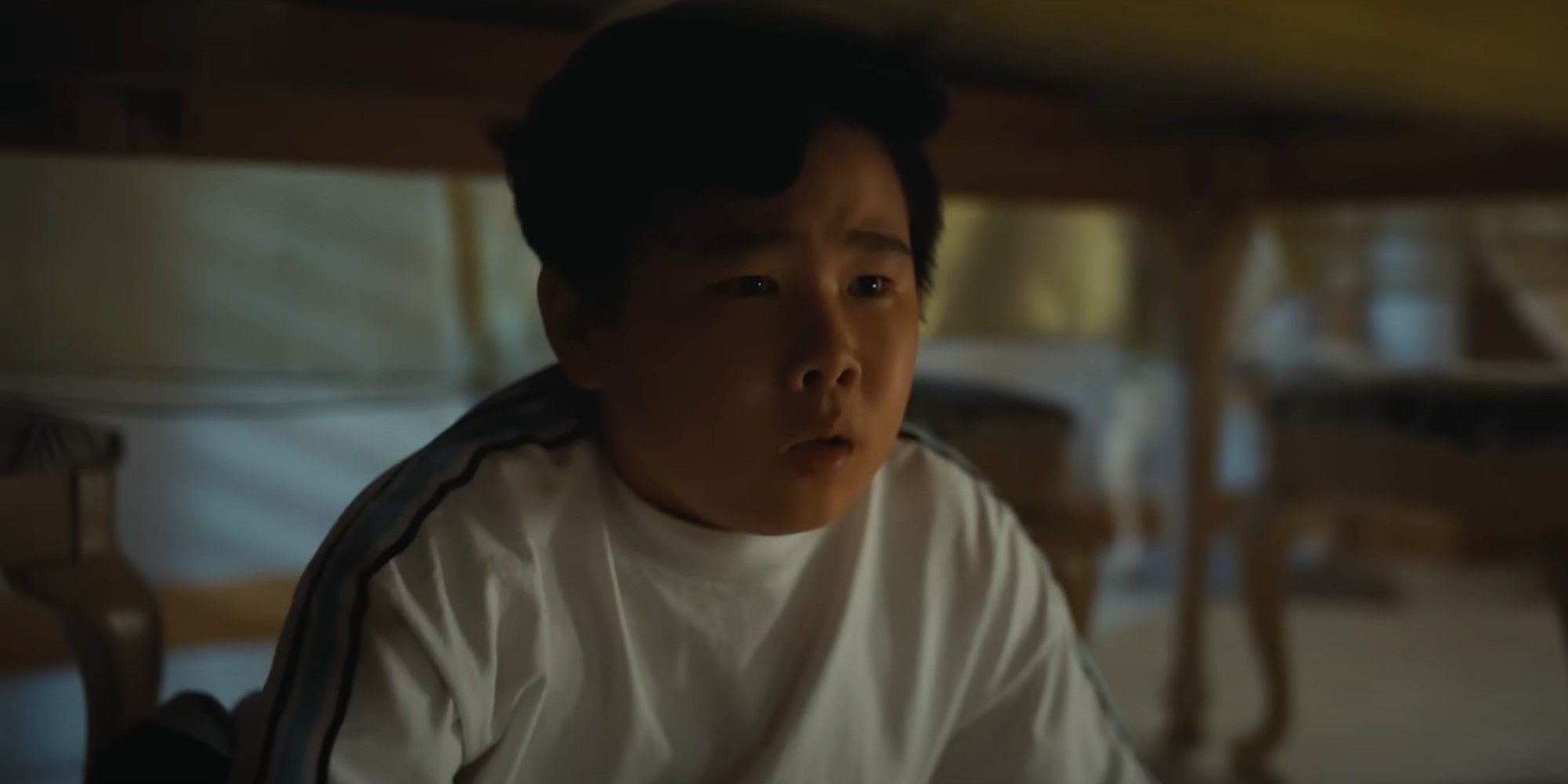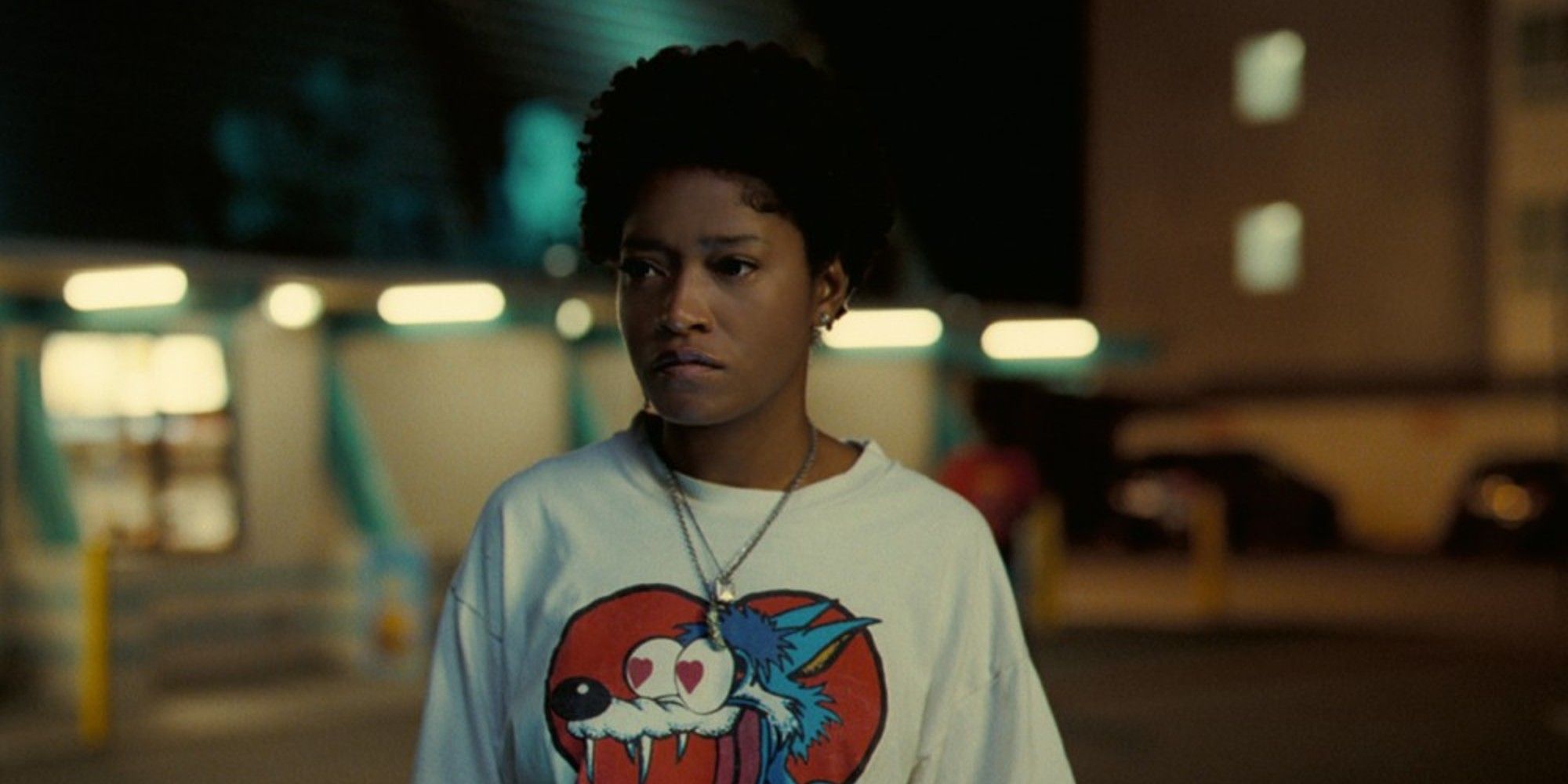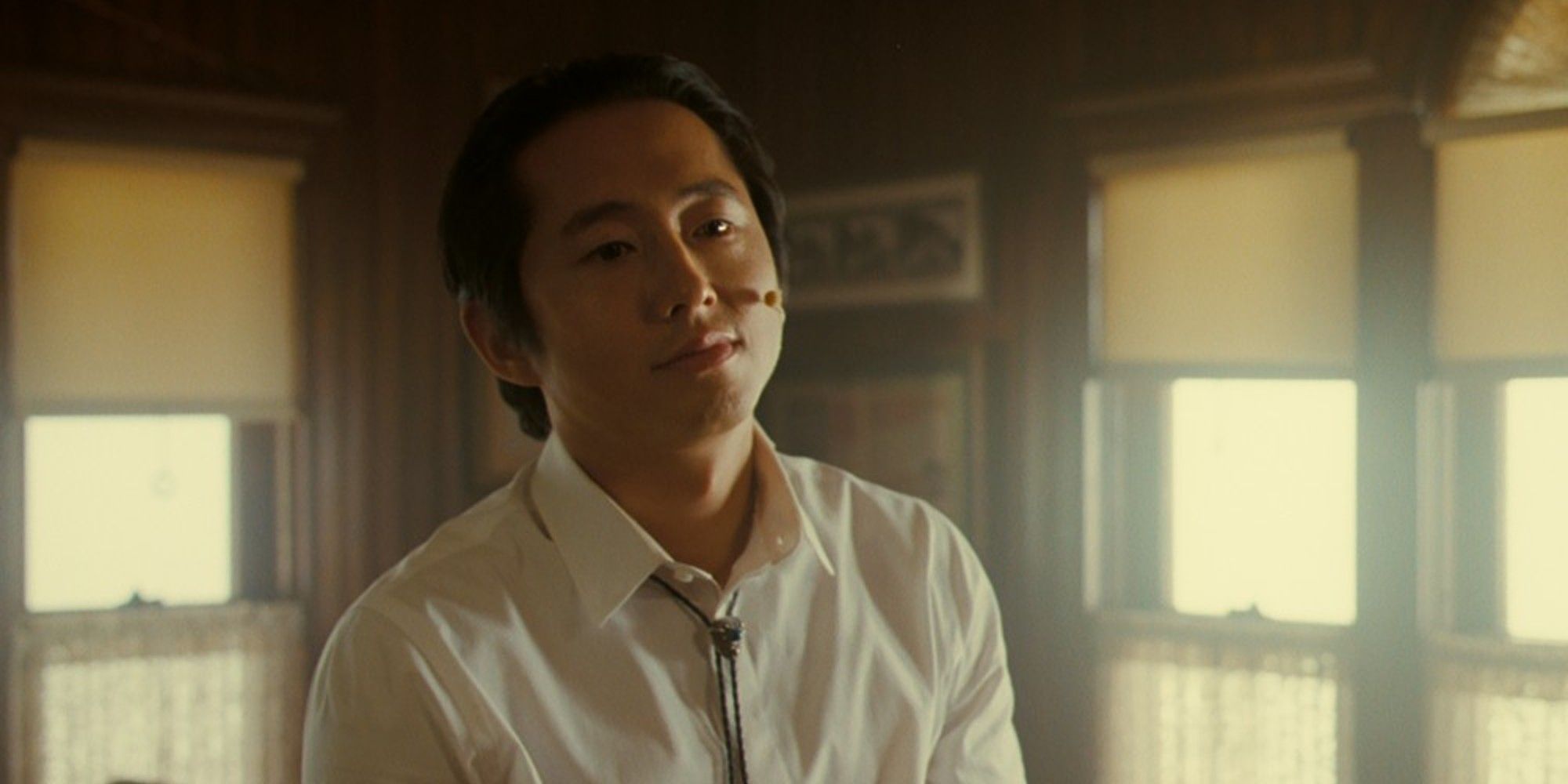In my review of Nope, I wrote that I felt it has reinvented what it meant to be both a Jordan Peele film and a summer blockbuster. It's one of the most refreshing big summer movies in years, but it also has clear roots in the first ever big summer movie, 1975's Jaws. Get Out was crystal clear in what the movie was 'about' (in the broad big picture sense that it was about racism and white people robbing Black culture while devaluing Black lives), but both Us and, to a greater extent, Nope leave things a little more ambiguous. I've always read Us as a statement on how America treats its citizens, and by the same token, Nope feels like it might be about how America treats its filmmakers.
This article contains major spoilers for Nope.
Nope is defined by the film industry. Daniel Kaluuya's OJ, the film's lead, is a Hollywood horse trainer who is barely scraping by despite the decades of loyal service he and his family have provided to the movie biz. Steve Yeun's character Jupe, meanwhile, is a former child star who was subjected to massive trauma after a sitcom scene involving a chimpanzee went wrong, leaving him frozen in time. His career never recovered, and he now lives off meagre applause while running a run-down amusement park full of relics of his past. Add in the fact the plot's driving motivation is not escaping life-or-death situations as in Peele's previous work, but instead capturing footage that will go viral and land OJ and his sister, Keke Palmer’s Em, a spot on Oprah, and it's clear this is a movie about the concept of fame and cinema itself.
This is underscored by the Jaws connection. Not only is Nope’s UFO-like beast largely unseen until the third act, it is also killed by an explosion in its maw, just as the shark from Jaws is when Brody shoots the gas canister. It's important that, in Jaws, they are hunting the beast out of protection. It is terrorising the waters. Brody wants the beaches shut, Quint respects the beasts of the sea after surviving the USS Indianapolis, and Hooper is a marine researcher aware of the havoc a shark like this can cause. In Nope, they are not motivated by self-preservation or goodwill, but by money. They want to capture the alien on film entirely so they can sell the images and make a profit.
One of the most striking images in Nope is the car key sticking out of the horse. When OJ's father is killed by falling debris (foreshadowing the looming threat of the alien beast), the set of car keys also plummets to Earth and juts out of the horse's rear end. If a horse were a car, this might be exactly where you'd expect the ignition to be. Hollywood as a whole treats animals as objects, not sentient creatures. OJ and his family are given little respect because hey, how hard is it to train a horse anyway? It's basically just like a car, right? This lack of respect for animals translates into a lack of respect for OJ, and in a wider sense, for all the people behind the scenes who make movies happen. It's also worth noting that the debris OJ's father dies from is a quarter – after decades of being underpaid, the man is killed by pocket change.
OJ, a lifelong animal trainer, does not lack respect for the beasts. He reveres them deeply, unable to sell up and move on even as his life savings dwindle away to nothing. It's OJ's knowledge of this that helps him understand the alien's secret: if you avoid looking it in the eye, you signal to it a sense of respect, and thus it leaves you alone. Jupe, his family, and his audience, on the other hand, are killed because they do not understand this, gawping skywards at it – but things are not so simple.
Jupe is shaped by the events of his tragic sitcom, where he was the only cast member left unscathed because of his respect for the chimp. When the chimpanzee finishes goring on one of the corpses, it catches sight of a terrified young Jupe cowering and approaches slowly. Rather than savage him, as it has every other cast member, it extends its hand out slowly for a fist bump – the same sort of fist bump Jupe has framed in a huge picture in his office. Jupe extends his hand back, displaying a mutual respect for the chimpanzee, and survives.
Jupe, however, forgets this lesson in adulthood. OJ is forced to sell his horses to Jupe to get by, planning on buying them back once he has the cash. OJ loves his horses, and assumes Jupe will treat them with similar respect. However, Jupe is instead using the horses as fodder, tempting the alien down to eat them while his patrons watch for amusement. He not only lacks respect for the horses, but the alien itself as he reduces it to a mere attraction. He has become like the producers of his ill-fated sitcom, using beasts he cannot control and does not understand for professional and financial gain. When one of OJ's horses refuses to leave its paddock, the alien instead eats Jupe and his crowd, who cannot look away even in their moment of death.
In the third act, OJ marks himself out as a hero, sacrificing himself to save his sister. OJ has mainly worn black t-shirts throughout the movie and moodily skulked in the background, shying away from the spotlight unlike loud, fame-hungry Em. In his moment of death, however, he dons a superhero costume – a bright orange outfit with neon yellow eyes on the rear of his hoodie, emblazoned with CREW across his back. Not MOVIE STAR. CREW. And yes, I do believe OJ died. It furthers the parallels between Nope and Jaws, with the most experienced of the crew dying a grisly death as OJ becomes Nope’s Quint.
That we see him at the end, surrounded by a swirl of smoke, feels like a comment on happy endings. It's what movies are supposed to have, isn't it? Not only that, but Em gets 'the shot'. She captures, clear as day, the alien itself. And yet, as the film crews roll up to give her her Oprah moment, was it worth it? If we take it that her brother is indeed dead (given that he runs in the opposite direction yet ends up in the same place, it feels likely he is a ghost), then was his loss worth it to get a grainy picture of an alien that people may not even believe? A picture taken, in another layer of entertainment commodification, not with a camera but with a cheesy amusement park attraction used to let tourists put their face on a sitcom poster.
The only other person to capture footage of the alien is Michael Wincott's Antlers Holst, a journeyed filmmaker who sees movies as art and not 'content'. He baulks at the idea of helping them with 'reality', but comes around when it is sold as a 'documentary'. He brings with him a hand-crank film camera he made himself and gets the perfect shot… but it's not enough. As the alien reappears for a second attack, the "lighting is perfect", so Holst goes for another shot. He willingly sacrifices himself to the beast because he was never after 'the shot' for the money, or the glory, or the Oprah spot. He wanted 'the shot' just to have the shot. He gets it, and he's prepared to kill himself for it.
Tellingly, Holst is shooting cheap commercials when we first meet him. How many other languishing artists in the film industry are slowly killing themselves with their work, and how many would die to have, just once, even if nobody saw it, a true masterpiece captured on film? How many crew members take the brunt of it all so the movie star – Em, with her good looks, charisma, side gigs in showbiz, and motorcycle stunts, is the closest the movie has to a classic star – can get the glory?
Nope is in some ways more shallow than Get Out or Us – there is inherently less to say about filmmaking than there is about racism or social justice. But it's also deeper – it provides fewer answers, it asks you more questions. Most of the time when summer blockbusters are billed as must-see, it's because of the high octane excitement, the dazzling CGI, the massive explosions, the white-knuckle car chases. None of those are in Nope. And yet it's a must-see anyway.
Source: Read Full Article



